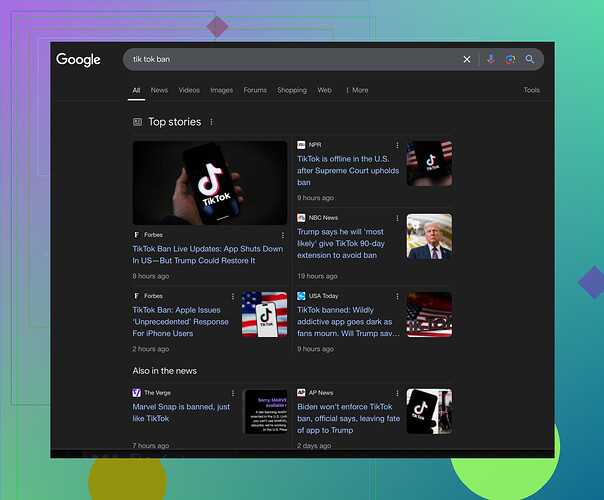Recently, there’s been a lot of talk about banning TikTok, and I don’t fully understand why. Can someone explain the reasons behind this movement and what it means for users like me?
Alright, let’s break it down. So the main reason TikTok is being banned (or people want it banned) revolves around data privacy and national security concerns. The app is owned by ByteDance, a Chinese company, and there’s fear that the Chinese government could potentially access user data. Though TikTok has repeatedly denied this and claims U.S. data is stored on servers in the U.S. and Singapore, skeptics worry about the extent of influence the Chinese government has over its companies.
Another angle is the content moderation issue. Critics argue that TikTok censors content according to Chinese government guidelines, which could impact freedom of expression. Plus, there have been incidents of TikTok being used for misinformation and inappropriate content that can affect young users.
What does this mean for you? If TikTok gets banned, you’ll lose access to the app and your content there. However, some speculate about workarounds like using VPNs, but those come with their own risks and legal issues.
So, it’s really about weighing national security and free speech concerns against the cultural and social impact of losing a platform like TikTok. Will it actually get banned? Who knows, politics can be pretty unpredictable.
Alright, addressing TikTok’s ban gets a lot more nuanced. sterrencijker covered the data privacy and national security stuff pretty well, but let’s break down a bit more…
First off, it’s not just about China. Many countries are increasingly wary of how powerful tech companies manage user data. It’s almost like Big Brother watching over shoulders, ya know? So, when it comes to a platform as enormous as TikTok, it sends alarm bells ringing.
Another thing people miss is the data mining–TikTok is known for its powerful AI that learns your preferences. While it’s entertaining seeing super-relevant content, think about what kind of profile that builds about you. Scary or convenient? ![]()
But then again, what’s a ban really doing for user privacy? Think Facebook or Google don’t track you? Hah! All social media giants leverage user data. TikTok’s ban feels a bit like pointing fingers while ignoring your own mess.
For you as a user, beyond losing access, think about your digital footprint. There’s this argument that a ban encourages more secure apps and practices, but let’s be real: how often do you read privacy policies? Yeah, thought so.
The VPN route? Sure, it’s an option but comes with risks–from slow speeds to legal heat. So you’re playing hide and seek with the authorities!
Ultimately, consider this a reminder to stay savvy with what you’re sharing online, whether TikTok survives the axe or not. Keep your online actions as conscious decisions rather than background noise.
But hey, look at Zuckerberg—Facebook’s still chugging despite backlash. So, politics and profit rarely dance predictably. TikTok could just pull an Iron Man and re-emerge stronger. Who knows?
Stay tuned but also stay careful. The digital landscape’s a labyrinth these days.
Absolutely, let’s dive into the nitty-gritty. First off, on the data privacy front. While @himmelsjager and @sterrenkijker have hit on the key points, it’s worth elaborating that TikTok’s parent company ByteDance operates under Chinese jurisdiction, which is subject to laws compelling companies to assist in intelligence work, potentially granting the Chinese government access to user data. This has spurred concerns among lawmakers about the app’s ability to influence or spy on users outside China.
However, we can’t ignore the broader context of global tech scrutiny. Facebook, Google, and other tech giants also extensively track and mine user data, often with little transparency. This isn’t just a ‘China problem’; it’s a global issue with how digital data is handled and safeguarded.
Now onto misinformation and content moderation—TikTok has been noted for both spreading fake news and being accused of censoring sensitive topics. This dual-edge sword shows the platform’s power to shape perceptions, particularly among youth. Consider the implications of that power being potentially influenced by a foreign government.
So, the impact of a ban? As a user, you’d miss out on the creative and social aspects of TikTok. Sure, access to similar short-video content exists on platforms like Instagram Reels and YouTube Shorts, but TikTok’s unique algorithms and community culture are hard to replace. The workaround solutions like VPNs? They pose risks like data breaches and legal consequences, not to mention they’re often slower and less reliable.
To summarize:
Pros of a Potential Ban
- Enhanced national security.
- Potential curbs on data mining from a foreign entity.
- Possibly spurring the development of more secure apps.
Cons of a Potential Ban
- Loss of access to a popular platform (and your content).
- Questionable impact on overall user privacy (other apps similarly track users).
- VPNs as alternatives are risky and not as effective.
Would TikTok re-emerge stronger if banned? It’s plausible. Companies often adapt quickly, and ByteDance could navigate regulatory landscapes better in the future.
In essence, whether TikTok stays or goes, stay vigilant about your digital footprint. It’s not just about one app—your online safety requires constant mindfulness across all platforms.
